 This is Rear Admiral B. James Lowe, U.S. Navy (ret.), a former submariner, as indicated by his extra large dolphins and submarine lapel pin. He’s talking with Sandra Richardson during a break at the City of Albuquerque’s Board of Ethics and Campaign Practices hearing Monday evening. Lowe is leading New Mexicans for Democracy in a recall effort against District 9 City Councillor Don Harris.
This is Rear Admiral B. James Lowe, U.S. Navy (ret.), a former submariner, as indicated by his extra large dolphins and submarine lapel pin. He’s talking with Sandra Richardson during a break at the City of Albuquerque’s Board of Ethics and Campaign Practices hearing Monday evening. Lowe is leading New Mexicans for Democracy in a recall effort against District 9 City Councillor Don Harris.http://www.recallharris.org/RecallHarris
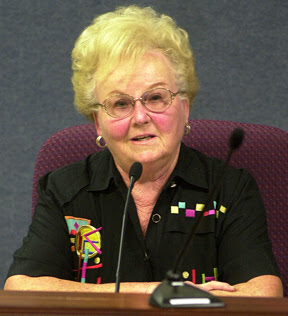 A second complaint, filed by former State Representative Martha “Marty” Lambert, left, alleging the improper use of the councillor’s city e-mail and telephone number for reaching him at the Committee to "Keep Don Harris" website. The e-mail address and council number were removed and changed to his law office numbers when pointed out by a Journal reporter.
A second complaint, filed by former State Representative Martha “Marty” Lambert, left, alleging the improper use of the councillor’s city e-mail and telephone number for reaching him at the Committee to "Keep Don Harris" website. The e-mail address and council number were removed and changed to his law office numbers when pointed out by a Journal reporter.http://www.keepdonharris.com/index.shtml
The current ethics board is made up of seven members.
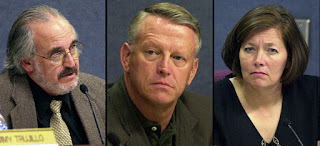 Three are selected as council appointees: Alan M. Schwartz, Sander A. Rue and Jolene Wolfley.
Three are selected as council appointees: Alan M. Schwartz, Sander A. Rue and Jolene Wolfley.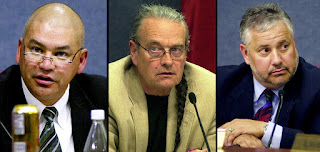 The mayor appoints three others: Benjamin Silva, Cliff Richardson and Jimmy Trujillo.
The mayor appoints three others: Benjamin Silva, Cliff Richardson and Jimmy Trujillo.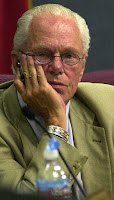 The six members then elect a chairman. Robert P. Tinnin Jr., has served for at least 10 years, though the Boards and Commissions ordinance limits service to two, three-year terms. A new ordinance specifically limits the term of the ethics board to two terms. Tinnin has been a contract lawyer for the city in the past while serving, though a check of the city’s legislative website does not reveal any current contracts. Tinnin, in the past, has argued that he is not an employee of the city and therefore not subject to the prohibition of serving on the board.
The six members then elect a chairman. Robert P. Tinnin Jr., has served for at least 10 years, though the Boards and Commissions ordinance limits service to two, three-year terms. A new ordinance specifically limits the term of the ethics board to two terms. Tinnin has been a contract lawyer for the city in the past while serving, though a check of the city’s legislative website does not reveal any current contracts. Tinnin, in the past, has argued that he is not an employee of the city and therefore not subject to the prohibition of serving on the board.Ten years ago, City Councillor Sam Bregman ran for Mayor and campaigned at police substations to on-duty officers.
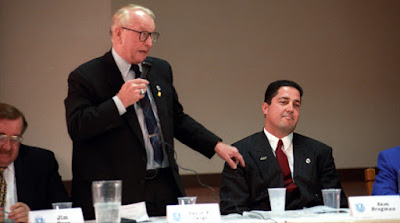 Here, former Gov. David Cargo, left, accuses fellow candidate Bregman, right, of improper campaigning, during a mayoral forum sponsored by the Albuquerque Police Officers Association, held July 31, 1997.
Here, former Gov. David Cargo, left, accuses fellow candidate Bregman, right, of improper campaigning, during a mayoral forum sponsored by the Albuquerque Police Officers Association, held July 31, 1997.A coalition of 15 groups complained to the ethics board. A hearing was scheduled for the week prior to the election. Bregman, in an ex-parte move, meaning behind the back and without notifying the other party, approached the chairman and asked for a continuance. Tinnin granted the request without so much as informing the other party. By the time the group found out about the continuance, the only option was to seek relief in State District Court. At a hearing the day before the election, the coalition presented a case before Judge W. Daniel Schneider. The group recognized that even if they were successful in proving that the continuance was granted improperly, they could not have a hearing before the election, in part because it could not meet the state’s open meetings act notice requirements. The coalition opted to make an argument to the court before the assembled news media. Bregman was soundly defeated as Jim Baca was elected mayor. In an analysis of the vote Bregman got a four-point boost over the final ratings survey before the election, possibly based on name recognition he got from our efforts to drag him before the ethics board.
Upon 10 years of reflection, I realize that trying to hold an ethics board the week before an election might constitute an actual interference with the democratic process by the sitting government. It doesn’t seem that way when you are in a heated political campaign. Though I wasn’t supporting Bregman, I hadn’t taken him on to support any of the other seven candidates that ran that year. I was only attacking Bregman’s campaign activity.

Harris requested a continuance of Tinnin, but got a very different result than Bregman had received. Could it be power politics now?
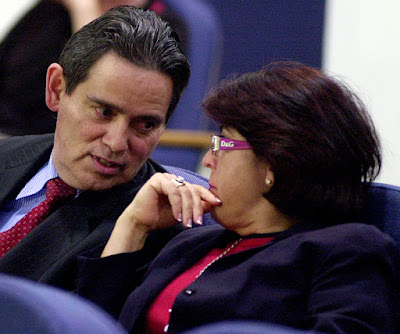 Harris called two accountants, former Republican State treasurer candidate Demesia Padilla, right, and current City Councillor Ken Sanchez, left, who had helped reconstruct his campaign's finances. They testified, that though Harris’ practices were unusual, they did not find anything that appeared criminal.
Harris called two accountants, former Republican State treasurer candidate Demesia Padilla, right, and current City Councillor Ken Sanchez, left, who had helped reconstruct his campaign's finances. They testified, that though Harris’ practices were unusual, they did not find anything that appeared criminal.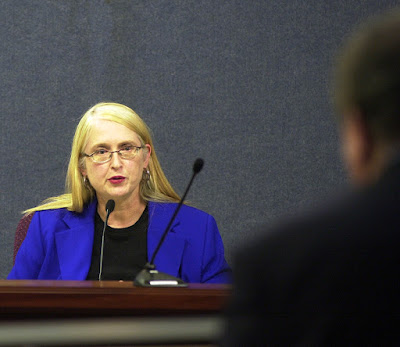 “Keep Don Harris” website’s Webmaster Rebecca Loring, left, testified that in constructing the site, she included the councillor’s city phone number and e-mail address as a standard practice of giving contact information. She went on to say that she changed the information when told to do so by Harris.
“Keep Don Harris” website’s Webmaster Rebecca Loring, left, testified that in constructing the site, she included the councillor’s city phone number and e-mail address as a standard practice of giving contact information. She went on to say that she changed the information when told to do so by Harris.After more than six hours of hearings, the ethics board voted to go into closed session, for adjudicatory function, on a 4-3 vote.
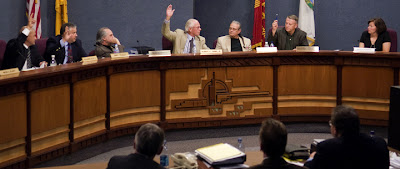 For, above, Silva, Trujillo, Tinnin and Rue while against, below, Schwartz, Richardson and Wolfley. This was the only show-of-hands vote of the evening.
For, above, Silva, Trujillo, Tinnin and Rue while against, below, Schwartz, Richardson and Wolfley. This was the only show-of-hands vote of the evening. 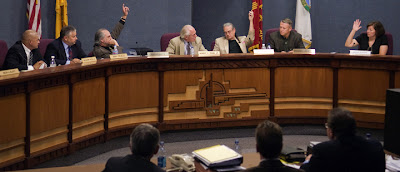
Harris was assessed $2,500 for violation of five sections of the ethics and elections rules. The second claim was dismissed because he had changed the e-mail and council phone number.

In 2003, during the start up of the ABQPAC ethics hearing against Mayor Martin Chávez, for taking more than $58,000 in illegal contributions, much of it from people and companies doing business with the city and city employees, then City Councillor Eric Griego sponsored a piece of legislation requiring any “Meetings and Hearings of the Albuquerque Board of Ethics and Campaign Practices be Televised Live on the Government Access Channel.” During the ABQPAC, hearing the deliberation was conducted in public. It’s the only time I know since the ordinance’s passage that the board has done so.
Chávez was found guilty of three violations and given a public reprimand.
After the ABQPAC hearing the ethics board has repeatedly ignored the ordinance and has used the exception to the open meetings act, that the city has prohibited by charter and ordinance, to go into closed sessions. The board has even refused to comply with an order from district court to deliberate in public.

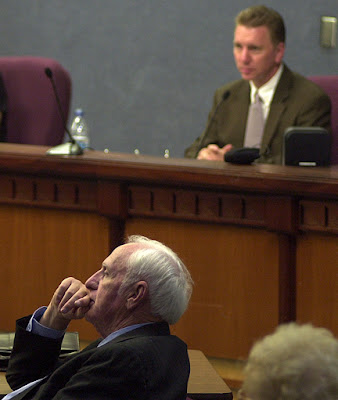
Harris admitted to making errors. Though some of the problems are of his own making, there were several problems that exacerbated the situation that belong squarely with the city administration. The reporting requirements for candidates and elected officials to post contributions and expenditures on the city clerks website requires a certain computer sophistication and it is not monitored by any city official. I have no problem with the requiring reports, but I believe that it should be the duty of the city to assure that they are posted correctly. The city changed and updated their software and yet expected those who used it to understand it without any training or assistance. They obviously don’t understand. Harris consulted with Assistant City Attorney Mark Shoesmith about what the city considered he could accept in terms of contributions. Shoesmith would later be involved by assisting in bringing charges to the ethics board.
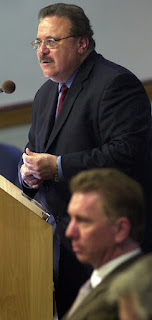 Harris' attorney, Douglas Antoon, right, in speaking about the Lambert complaint expressed his concern that limiting communication devices might create a slippery slope towards eliminating constituent contacts. Antoon pointed out that this was not the classic use of the government’s assets that are normally prohibited because Harris is not in the role of a candidate.
Harris' attorney, Douglas Antoon, right, in speaking about the Lambert complaint expressed his concern that limiting communication devices might create a slippery slope towards eliminating constituent contacts. Antoon pointed out that this was not the classic use of the government’s assets that are normally prohibited because Harris is not in the role of a candidate.Board member Schwartz raised an interesting issue about the timing of the complaint. It seems that the violation had to have happened within a specific period of time prior to the election. His question was how could one determine the violation before a date was set for the special recall election. Schwartz argued that one would have to work backwards from the date of the election that had not yet been set.
The board decided to dismiss the Lambert complaint because Harris had rectified it upon being made aware of the possible problem and not because it actually did not constitute a violation, Antoon explained.
In taking the vote on the seven charges facing Harris, Tinnin simply announced the majority vote without identifying how each member voted, a violation of city rules on recording votes for council, which also applies, by the same rule, to all boards and commissions. Several members, especially on the right side of the dais did not respond verbally and one could not tell which way they voted or if they had abstained. I believe that each vote did pass by at least four votes, a majority.
So what’s wrong with this picture?
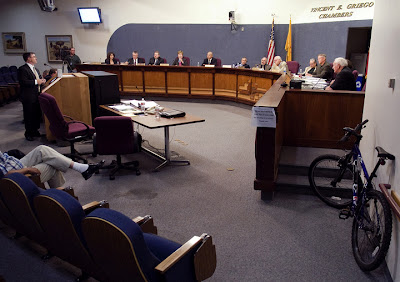 This is Harris’ bicycle that he rode while going door to door during the campaign two years ago. This bike is a replacement for his original one that was stolen. The Admiral’s group tried to make a big deal of Harris claiming the purchase as a campaign expense. Campaign rules allow for legitimate travel expenses. The bicycle was the only transportation expense claimed by Harris.
This is Harris’ bicycle that he rode while going door to door during the campaign two years ago. This bike is a replacement for his original one that was stolen. The Admiral’s group tried to make a big deal of Harris claiming the purchase as a campaign expense. Campaign rules allow for legitimate travel expenses. The bicycle was the only transportation expense claimed by Harris. An extensive audit was done on Harris’ campaign and the board’s contracted accountant Helen Elliott, left, of Elliott, Pohlman & Co., CPAs, outlined several categories of potential violations. She produced a rather complex and somewhat confusing matrix. The complainants looked at each and every name as a possible violation and hoped for extreme fines. Not all accusations were covered by the two complaints filed and heard on Monday. Harris had been granted time to research and prepare for a later hearing because some of the charges were not as timely made as the others.
An extensive audit was done on Harris’ campaign and the board’s contracted accountant Helen Elliott, left, of Elliott, Pohlman & Co., CPAs, outlined several categories of potential violations. She produced a rather complex and somewhat confusing matrix. The complainants looked at each and every name as a possible violation and hoped for extreme fines. Not all accusations were covered by the two complaints filed and heard on Monday. Harris had been granted time to research and prepare for a later hearing because some of the charges were not as timely made as the others.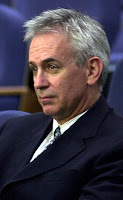 This is Attorney Patrick J. Rogers of the Modrall Sperling law firm. He is known for being a First Amendment specialist and representing issues for the State Republican Party. One of his main concerns is fighting voter fraud. When asked, what interest he had in the hearing he said, just a general one, that he actually had put his car in the shop and was waiting to hitch a ride home with one of the board members. Little did anyone know that the voter fraud issue would come to the forefront.
This is Attorney Patrick J. Rogers of the Modrall Sperling law firm. He is known for being a First Amendment specialist and representing issues for the State Republican Party. One of his main concerns is fighting voter fraud. When asked, what interest he had in the hearing he said, just a general one, that he actually had put his car in the shop and was waiting to hitch a ride home with one of the board members. Little did anyone know that the voter fraud issue would come to the forefront. 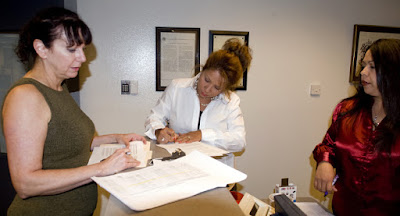 A Harris supporter, Ellen Ward, above left, filed a complaint with the board of ethics and campaign practices against New Mexicans for Democracy, stating her signature was forged on the recall petition.
A Harris supporter, Ellen Ward, above left, filed a complaint with the board of ethics and campaign practices against New Mexicans for Democracy, stating her signature was forged on the recall petition. In her complaint, she wrote that on Sept. 12, she “received letter in mail that thanked me for signing the petition to recall Councillor Don Harris.” The signature Ward made in her complaint along with the printed name and address bear no similarities, at least to this layman’s eye.
Ward believes their are at least eight other possible forged signatures.
 “It goes to the sheriff’s department,” Assistant City Clerk Kelli A. Fulgenzi, ieft, said, because the city clerk has to rely on the county clerk for the voter registration information.
“It goes to the sheriff’s department,” Assistant City Clerk Kelli A. Fulgenzi, ieft, said, because the city clerk has to rely on the county clerk for the voter registration information.An affidavit in support of the recall petitions was filed with the paperwork by the New Mexico for Democracy on behalf of a woman paid by them to collect signatures. The woman will not be named here because there is no verification that she, in fact is the one who collected the signatures. She has not been named by law enforcement as a suspect and I will not publish before the sheriff has an opportunity to start his investigation because it might be perceived as interference.
 My take.
My take.The group led by the Admiral was bound and determined to recall Harris. Harris has said that they promised to recall him should he be elected, even before the runoff election took place. New Mexicans for Democracy proceeded with military efficiency including the use of what appears to be covert operatives. It seems that this is a civilianized military coup d'état.
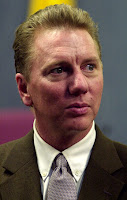 By Harris’ own admissions of his sloppy bookkeeping, the violations seem to be technical and did not encompass individual acts but rather a violation repeated many times because his understanding was wrong, not that he was trying to hide something over and over again.
By Harris’ own admissions of his sloppy bookkeeping, the violations seem to be technical and did not encompass individual acts but rather a violation repeated many times because his understanding was wrong, not that he was trying to hide something over and over again.I don’t have a dog in this fight. I am just looking for a fair and open process and can’t find one.
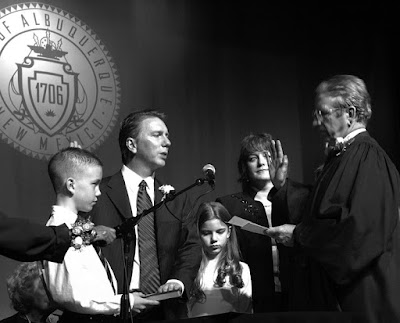 In an effort to fully disclose, Harris used a picture of himself that I had sold to him, for personal use, with the caveat that it not be used for political purposes. He used this inaugural picture on his “Keep Don Harris” website. I am not billing him for its use, but it is not signifying either support or opposition of him.
In an effort to fully disclose, Harris used a picture of himself that I had sold to him, for personal use, with the caveat that it not be used for political purposes. He used this inaugural picture on his “Keep Don Harris” website. I am not billing him for its use, but it is not signifying either support or opposition of him.
So let’s get back to the original picture of Sandra Richardson, the wife of Ethics Board member Cliff Richardson.
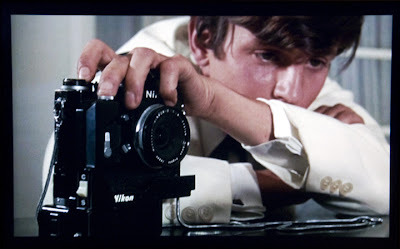 Maybe I shouldn’t have watched my favorite political thriller movie, “Z,” just before going to the meeting. In the movie, the journalist, represented by a photojournalist, above, photographed people in public places that led to the identities of the assassins of a Greek minister. The movie is based on real events that ultimately toppled the Greek government and led to the colonels taking power as a military dictatorship in the early 1960s.
Maybe I shouldn’t have watched my favorite political thriller movie, “Z,” just before going to the meeting. In the movie, the journalist, represented by a photojournalist, above, photographed people in public places that led to the identities of the assassins of a Greek minister. The movie is based on real events that ultimately toppled the Greek government and led to the colonels taking power as a military dictatorship in the early 1960s.When I took the picture of Richardson and Lowe, it was because she is a politically active citizen having been associated with the district 4 campaign of candidate Paulette de Pascal. Richardson wrote, what is being called the “Honey-Bee” e-mail. De Pascal wrote, in defending herself and trying to distance herself from Richardson, that someone who wanted to be associated with her campaign wrote the e-mail. Without mentioning Richardson by name, de Pascal gave the impression that she removed her from being a close consultant. However, at the mayoral forum held Sept. 6, at the Broadway Community Center, the Richardsons were present.
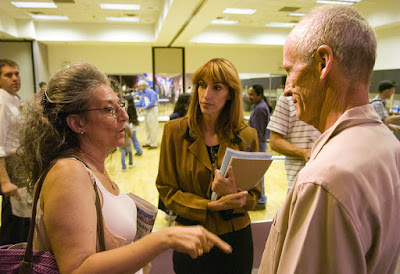 After the meeting, Sandra Richardson, left, spoke with de Pascal, center, and Tom Koch, right, about the forum performance. Richardson announced that though she was married to a member of the ethics board, she was going to speak her own mind. She is correct of course, but it also means she will be subject to the role of a public person. In addition she sits on at least two public boards.
After the meeting, Sandra Richardson, left, spoke with de Pascal, center, and Tom Koch, right, about the forum performance. Richardson announced that though she was married to a member of the ethics board, she was going to speak her own mind. She is correct of course, but it also means she will be subject to the role of a public person. In addition she sits on at least two public boards.Richardson asked, “What are you taking pictures for?” I closed my distance to conversational space and told her I was a freelancer….
She said, “Well, you can’t take my picture.”
I told her, “You are in a public place….”
She shot back, “I know the law, you have to get my permission….”
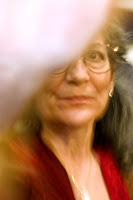 I lifted my camera to take her picture and she reached out to cover the lens, touching the camera. I told her not to touch the camera and not to assault me.
I lifted my camera to take her picture and she reached out to cover the lens, touching the camera. I told her not to touch the camera and not to assault me.She stammered, “Don’t you assault me!”
The law sides with me. People in public places are subject to being photographed.
If Ms. Richardson doesn’t want to be subjected to scrutiny, maybe she shouldn’t get so excited or relaxed in public.
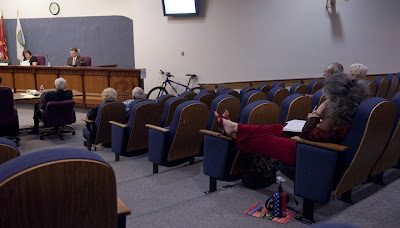
There is that one other little thing about this recall; should it succeed, Mayor Chávez would get to appoint Harris’ replacement.
No comments:
Post a Comment